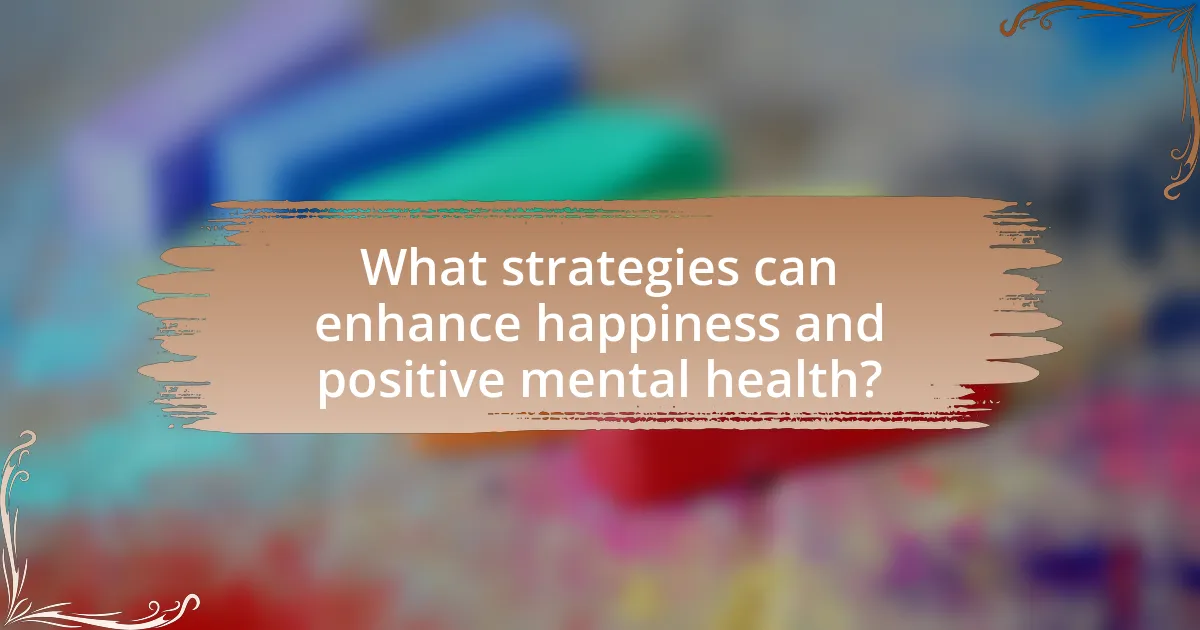The Science of Happiness examines the factors contributing to human well-being and fulfillment, integrating insights from psychology, neuroscience, and sociology. Key elements influencing happiness include strong social connections, a sense of purpose, and positive emotions, which are linked to better mental and physical health. The article explores various psychological theories of happiness, cultural influences, and the importance of studying happiness for mental health. It also discusses practical strategies for enhancing happiness, such as practicing gratitude, engaging in physical activity, and fostering social connections, while addressing common barriers to achieving happiness and the role of mindfulness in emotional regulation.

What is the Science of Happiness?
The Science of Happiness is the study of what contributes to human well-being and fulfillment. This field combines insights from psychology, neuroscience, and sociology to understand the factors that lead to a happy and meaningful life. Research indicates that elements such as strong social connections, a sense of purpose, and positive emotions significantly enhance happiness levels. For instance, a study published in the journal “Psychological Science” by Ed Diener and Martin Seligman found that individuals with strong social ties report higher levels of happiness and life satisfaction.
How is happiness defined in psychological terms?
Happiness in psychological terms is defined as a state of well-being characterized by emotions ranging from contentment to intense joy. This definition encompasses both the presence of positive emotions and the absence of negative emotions, as outlined in the subjective well-being theory. Research by Ed Diener, a prominent psychologist in this field, emphasizes that happiness is not solely about momentary pleasure but also involves life satisfaction and a sense of purpose. Studies indicate that individuals who report higher levels of happiness tend to have better physical health, stronger relationships, and greater resilience, reinforcing the importance of happiness in overall mental health.
What are the key theories of happiness in psychology?
The key theories of happiness in psychology include the Hedonic Theory, which posits that happiness is derived from pleasure and the avoidance of pain; the Eudaimonic Theory, emphasizing the importance of meaning and self-realization in achieving happiness; and the Positive Psychology Theory, which focuses on strengths, virtues, and factors that contribute to a fulfilling life. Research by Seligman (2011) in “Flourish” supports the Positive Psychology Theory, highlighting that well-being encompasses positive emotions, engagement, relationships, meaning, and accomplishment. Additionally, the Set Point Theory suggests that individuals have a baseline level of happiness influenced by genetics and personality traits, as discussed by Lykken and Tellegen (1996) in their study on happiness stability.
How do cultural differences influence the perception of happiness?
Cultural differences significantly influence the perception of happiness by shaping values, beliefs, and social norms. For instance, collectivist cultures, such as those in many Asian countries, often associate happiness with community and familial relationships, prioritizing social harmony over individual achievement. In contrast, individualistic cultures, like those in the United States, tend to equate happiness with personal success and self-fulfillment. Research by Diener and Suh (2000) in “Culture and Subjective Well-Being” highlights that cultural context affects how individuals define and pursue happiness, demonstrating that subjective well-being varies across cultures based on these differing priorities and values.
Why is studying happiness important for mental health?
Studying happiness is important for mental health because it directly influences emotional well-being and resilience. Research indicates that higher levels of happiness correlate with lower rates of mental health disorders, such as depression and anxiety. For instance, a study published in the Journal of Happiness Studies found that individuals who reported higher life satisfaction experienced significantly fewer mental health issues. Additionally, understanding the factors that contribute to happiness can inform therapeutic practices and interventions, promoting healthier coping mechanisms and enhancing overall mental health outcomes.
What impact does happiness have on physical health?
Happiness significantly impacts physical health by enhancing immune function and reducing the risk of chronic diseases. Research indicates that individuals who report higher levels of happiness experience lower levels of stress hormones, which can lead to improved cardiovascular health and a stronger immune response. A study published in the journal “Health Psychology” found that happier individuals had a 50% lower risk of developing heart disease compared to their less happy counterparts. Additionally, happiness is associated with healthier lifestyle choices, such as regular exercise and balanced nutrition, further contributing to overall physical well-being.
How does happiness relate to overall life satisfaction?
Happiness is a significant predictor of overall life satisfaction. Research indicates that individuals who report higher levels of happiness tend to evaluate their lives more positively, leading to greater life satisfaction. For instance, a study published in the Journal of Happiness Studies found that happiness accounts for approximately 50% of the variance in life satisfaction among individuals, highlighting the strong correlation between the two constructs. This relationship suggests that fostering happiness can enhance one’s perception of life satisfaction, making it a crucial focus in strategies for positive mental health.

What strategies can enhance happiness and positive mental health?
Practicing gratitude enhances happiness and positive mental health. Research indicates that regularly expressing gratitude can lead to increased well-being and life satisfaction. A study published in the Journal of Personality and Social Psychology by Emmons and McCullough found that participants who kept a gratitude journal reported higher levels of positive emotions and lower levels of depression. Engaging in physical activity also contributes significantly to mental health; the World Health Organization states that regular exercise can reduce symptoms of anxiety and depression. Additionally, fostering social connections is crucial; a meta-analysis in the journal PLOS Medicine found that strong social relationships are linked to a 50% increased likelihood of survival, highlighting their importance for mental well-being. Mindfulness practices, such as meditation, have been shown to reduce stress and improve emotional regulation, as evidenced by research from the American Psychological Association. These strategies collectively support enhanced happiness and positive mental health.
How can mindfulness practices contribute to happiness?
Mindfulness practices contribute to happiness by enhancing emotional regulation and reducing stress. Research indicates that individuals who engage in mindfulness techniques, such as meditation and focused breathing, experience lower levels of anxiety and depression, which are significant barriers to happiness. A study published in the journal “Psychological Science” by Zeidan et al. (2010) found that just a few sessions of mindfulness meditation can improve mood and increase feelings of well-being. Additionally, mindfulness fosters a greater appreciation for the present moment, leading to increased life satisfaction. This is supported by findings from a meta-analysis in “Clinical Psychology Review” by Khoury et al. (2015), which concluded that mindfulness-based interventions significantly enhance overall happiness and quality of life.
What are effective mindfulness techniques for beginners?
Effective mindfulness techniques for beginners include focused breathing, body scan meditation, and mindful observation. Focused breathing involves concentrating on the breath, which helps anchor attention and reduce distractions. Body scan meditation encourages individuals to mentally scan their bodies for tension, promoting relaxation and awareness of physical sensations. Mindful observation entails paying close attention to the environment, such as noticing sounds, sights, and smells, fostering a deeper connection to the present moment. Research indicates that these techniques can enhance emotional regulation and reduce stress, contributing to overall mental well-being.
How does mindfulness affect emotional regulation?
Mindfulness enhances emotional regulation by promoting awareness and acceptance of emotions without judgment. This practice allows individuals to observe their emotional responses, leading to better control over reactions and reducing impulsivity. Research indicates that mindfulness training can increase activity in brain regions associated with emotional regulation, such as the prefrontal cortex, while decreasing activity in the amygdala, which is linked to emotional reactivity. A study published in the journal “Emotion” by Zeidan et al. (2010) found that participants who engaged in mindfulness meditation showed significant improvements in emotional regulation compared to those who did not practice mindfulness.
What role does social connection play in happiness?
Social connection significantly enhances happiness by providing emotional support, fostering a sense of belonging, and promoting positive interactions. Research indicates that individuals with strong social ties experience lower levels of stress and anxiety, which contributes to overall well-being. For instance, a study published in the journal “Psychological Science” found that people with robust social networks reported higher life satisfaction and happiness levels. Additionally, social connections can lead to increased feelings of purpose and fulfillment, reinforcing the idea that relationships are crucial for mental health and happiness.
How can building relationships improve mental health?
Building relationships can significantly improve mental health by providing emotional support, reducing feelings of loneliness, and enhancing overall well-being. Social connections foster a sense of belonging and purpose, which are crucial for mental resilience. Research indicates that individuals with strong social ties experience lower levels of anxiety and depression. For instance, a study published in the journal “Psychological Science” found that social support can buffer against stress and promote healthier coping mechanisms. Additionally, the American Psychological Association highlights that positive relationships contribute to better mental health outcomes, including increased happiness and life satisfaction.
What are the best practices for fostering meaningful connections?
The best practices for fostering meaningful connections include active listening, expressing empathy, and engaging in shared experiences. Active listening involves fully concentrating on the speaker, which enhances understanding and builds trust. Research indicates that effective communication, characterized by empathy and validation, strengthens relationships and promotes emotional well-being. Engaging in shared experiences, such as participating in group activities or volunteering together, fosters a sense of belonging and connection. According to a study published in the Journal of Happiness Studies, individuals who engage in meaningful interactions report higher levels of life satisfaction and emotional health.

What are the common barriers to achieving happiness?
Common barriers to achieving happiness include negative thought patterns, lack of social support, and unmet basic needs. Negative thought patterns, such as pessimism and self-criticism, can lead to feelings of inadequacy and hopelessness, which hinder happiness. Research indicates that individuals with strong social support networks report higher levels of happiness, while those who feel isolated often experience lower well-being. Additionally, unmet basic needs, such as food, shelter, and safety, create stress and anxiety, making it difficult to focus on positive aspects of life. These barriers collectively impede the pursuit of happiness and well-being.
How do negative thought patterns affect happiness?
Negative thought patterns significantly diminish happiness by fostering feelings of hopelessness and anxiety. These cognitive distortions, such as catastrophizing or overgeneralizing, lead individuals to perceive situations more negatively than they are, which can result in decreased motivation and increased stress. Research indicates that individuals who engage in negative thinking are more likely to experience symptoms of depression and lower overall life satisfaction. For instance, a study published in the Journal of Happiness Studies found that negative thought patterns correlate with reduced emotional well-being and increased psychological distress. This evidence underscores the detrimental impact of negative thinking on an individual’s capacity for happiness.
What strategies can help overcome negative thinking?
Cognitive restructuring is a key strategy to overcome negative thinking. This technique involves identifying and challenging distorted thoughts, replacing them with more balanced and realistic perspectives. Research indicates that cognitive-behavioral therapy (CBT), which employs cognitive restructuring, has been shown to significantly reduce symptoms of depression and anxiety, as evidenced by a meta-analysis published in the journal “Psychological Bulletin,” which found that CBT is effective for a wide range of mental health issues. Additionally, practicing mindfulness can help individuals become more aware of their negative thoughts and reduce their impact, as supported by studies demonstrating that mindfulness-based interventions improve emotional regulation and decrease negative thinking patterns.
How can cognitive behavioral therapy aid in improving happiness?
Cognitive behavioral therapy (CBT) can aid in improving happiness by helping individuals identify and change negative thought patterns and behaviors that contribute to unhappiness. CBT teaches clients to recognize cognitive distortions, such as all-or-nothing thinking or catastrophizing, which can lead to feelings of sadness or anxiety. Research indicates that CBT is effective in reducing symptoms of depression and anxiety, which are closely linked to overall happiness. A meta-analysis published in the journal “Psychological Bulletin” found that CBT significantly improves mood and well-being, demonstrating its efficacy in enhancing happiness through structured interventions that promote positive thinking and coping strategies.
What lifestyle changes can promote a happier life?
Engaging in regular physical activity, maintaining a balanced diet, fostering social connections, practicing mindfulness, and ensuring adequate sleep can significantly promote a happier life. Research indicates that physical activity releases endorphins, which enhance mood and reduce stress (Mayo Clinic, 2021). A balanced diet rich in fruits, vegetables, and whole grains supports brain health and emotional well-being (Harvard Health Publishing, 2020). Social connections provide emotional support and increase feelings of belonging, which are crucial for happiness (Holt-Lunstad et al., 2010). Mindfulness practices, such as meditation, have been shown to reduce anxiety and improve overall life satisfaction (Kabat-Zinn, 1990). Lastly, adequate sleep is essential for emotional regulation and cognitive function, with studies linking sleep deprivation to increased irritability and decreased happiness (Walker, 2017).
How does physical activity influence mental well-being?
Physical activity significantly enhances mental well-being by reducing symptoms of anxiety and depression while improving mood and cognitive function. Engaging in regular exercise stimulates the release of endorphins, neurotransmitters that promote feelings of happiness and euphoria. Research published in the journal “JAMA Psychiatry” indicates that individuals who engage in physical activity experience a 20-30% reduction in the risk of developing depression. Additionally, a study by the University of Vermont found that aerobic exercise can lead to improvements in self-esteem and overall life satisfaction. These findings underscore the positive correlation between physical activity and mental health, demonstrating its effectiveness as a strategy for enhancing emotional well-being.
What dietary choices support positive mental health?
Dietary choices that support positive mental health include a balanced intake of omega-3 fatty acids, whole grains, fruits, vegetables, and lean proteins. Omega-3 fatty acids, found in fish like salmon and walnuts, are linked to reduced symptoms of depression and anxiety, as evidenced by a meta-analysis published in the Journal of Clinical Psychiatry, which found that individuals with higher omega-3 intake had a lower risk of depression. Whole grains and fiber-rich foods help stabilize blood sugar levels, which can positively influence mood. Additionally, a diet rich in fruits and vegetables provides essential vitamins and antioxidants that combat oxidative stress, contributing to improved mental well-being. Lean proteins, such as chicken and legumes, supply amino acids necessary for neurotransmitter production, further supporting mental health.
What practical tips can individuals implement for greater happiness?
To achieve greater happiness, individuals can practice gratitude by regularly reflecting on and writing down things they are thankful for. Research indicates that gratitude can significantly enhance overall well-being; a study published in the Journal of Personality and Social Psychology found that participants who kept a gratitude journal reported higher levels of positive emotions and life satisfaction. Additionally, engaging in regular physical activity has been shown to boost mood and reduce symptoms of depression, as evidenced by a meta-analysis in JAMA Psychiatry, which concluded that exercise is associated with a lower risk of depression. Lastly, fostering social connections through meaningful relationships can lead to increased happiness, supported by findings from the Harvard Study of Adult Development, which highlighted that strong social ties are a key predictor of happiness and longevity.
How can gratitude practices enhance overall happiness?
Gratitude practices enhance overall happiness by fostering positive emotions and improving mental well-being. Engaging in gratitude activities, such as keeping a gratitude journal or expressing thanks, has been shown to increase feelings of joy and satisfaction. Research conducted by Emmons and McCullough (2003) found that participants who practiced gratitude reported higher levels of positive affect and lower levels of depression compared to those who did not engage in such practices. This suggests that gratitude can shift focus from negative to positive experiences, thereby enhancing overall happiness.
What daily habits contribute to sustained positive mental health?
Daily habits that contribute to sustained positive mental health include regular physical exercise, mindfulness practices, adequate sleep, and social connections. Engaging in physical exercise, such as aerobic activities, has been shown to release endorphins, which improve mood and reduce anxiety. Mindfulness practices, including meditation and deep-breathing exercises, enhance emotional regulation and decrease stress levels. Research indicates that adults who get 7-9 hours of sleep per night experience better mental health outcomes, as sleep is crucial for cognitive function and emotional stability. Additionally, maintaining strong social connections has been linked to lower rates of depression and anxiety, as supportive relationships provide emotional resources and a sense of belonging.










